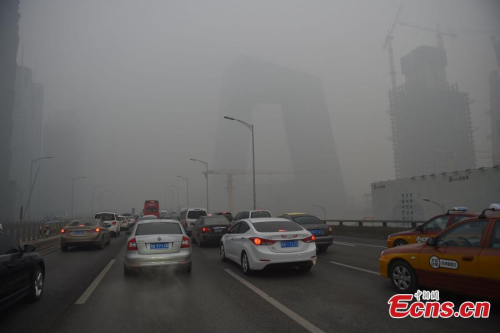
Vehicles run amid heavy smog and thick fog in Beijing, Dec. 25, 2015. (File photo: China News Service/Jin Shuo)
(ECNS) – Beijing is revising its emergency response plans for heavy pollution days, the Beijing Youth Daily reported on Wednesday.
The new plans will take into consideration the difference between the city's southern and northern areas, and adopt different plans if the air quality varies during the same period of time.
On heavy pollution days, a traffic ban will be imposed on China I-III emission standard vehicles, meaning that higher-emission vehicles will be banned first on the city's roads, according to Li Xiang, deputy head of atmospheric environment management at the Beijing Municipal Environmental Protection Bureau.
Vehicles will be subject to penalty points if they are found in violation of emission standards.
In early February, the Chinese Ministry of Environmental Protection (MEP) standardized the criteria for "heavy pollution" alerts in Beijing and its two neighbors, Tianjin and Hebei province. Six cities -- Beijing, Tianjin, Tangshan, Baoding, Langfang and Cangzhou -- took the lead in piloting the program, which will last until the end of March.
Under the same criteria for all four levels of warning, the six cities are allowed to implement their own contingency plans, according to Li.
Li said Beijing will strictly implement the MEP's alert criteria, but will adopt different response plans for the city's northern and southern parts if the air quality is different in the same period of time.
Also, the city's traffic management and environmental protection authorities are merging their databases to improve vehicle management during road traffic bans, the paper said.
Beijing will step up monitoring and severely punish drivers whose vehicles violate emission rules. The city is also conducting research on a demerit point system for higher-than-standard emission vehicles, as well as vehicles from other parts of the country on the city's roads.
This year, Beijing plans to double the number of air quality monitoring sites to 70, and expand some of its existing ones. Expansion and new construction projects are underway, most of which are set to be completed and put into trial operation in May. All expansion projects are to be up and running by October.


















































